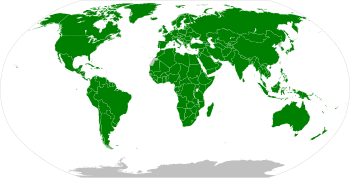 |
| (Photo credit: Wikipedia) |
As such, five countries are going to contribute more than 100 billion euros for the new fund and 50 billion euros for the new growth bank.
Basically, they are attempting to create an equivalent organization to the International Monetary Fund (IMF) and the World Bank because they feel that the Americans and Europeans are not listening or dealing with their problems.
As is known, the IMF and World Bank, which were established after the second World War in order to ensure the stability of the financial system, were governed exclusively by Americans and Europeans and the truth is that over time their role did not turn out to the best for the developing countries and the third world.
Since then a lot has changed.
Globalization has offered opportunities and capital to Asian, Latin American and African countries, thus increasing their demands from the richer and more powerful countries on the planet.
In time though, they realized that the Americans and Europeans had their own priorities and that they were not prepared to give up any of their financial power and they became indignant.
That is more or less how they decided to establish their own institutions and gain greater flexibility in handling their problems and covering their needs.
It is interesting that the handling of the Greek financial crisis was the straw that broke the camel’s back. Many may not remember this, but the greatest objections to the IMF’s rescue program for Greece came from Brazil, Russia and Mexico.
These countries considered the aid towards a developed European country like Greece to be excessive, compared to what was offered to Asian or Latin American countries.
The objections obviously went unheard, since the Americans and Europeans considered the Greek crisis capable of disrupting the stability of the European economy primarily and the American economy secondarily.
That is more or less why the nouveau riche, indignant from the stance of Europeans and Americans, decided to carry out this act of emancipation and create their own financial institutions.
Nobody can tell how this attempt will turn out.
The first step has been made though. The doubt is a given and indicative of the new multipolar world that has emerged from the burgeoning globalization.
The world is more interconnected and interdependent than ever. The financial interest of countries are interlocked and intertwined. No country can feel safe just because it is a member of an economic zone.
That is what become clear in the navel-gazing Greek politics; the world is more complex, more competitive and intertwined to the greatest degree.
There are many dangers, but many more opportunities. All that is necessary is for the house to be neat and protected.




